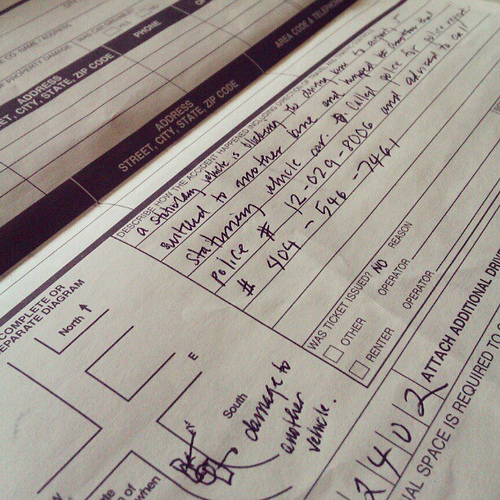How to Get Your Police Report
 Your police report is the backbone of your accident claim; it is the statement that you will fill out on the scene and the one that will be evaluated in the light of statements by witnesses and responding officers. Unless other accounts suggest otherwise, it is presumed to be one of the most authentic documents that comprise a claim. It provides a framework for any photographs you take and the damage to your vehicle. Knowing how to fill one out and how to access it later are key to filing a successful claim. The following is a four step process to obtaining a police report.
Your police report is the backbone of your accident claim; it is the statement that you will fill out on the scene and the one that will be evaluated in the light of statements by witnesses and responding officers. Unless other accounts suggest otherwise, it is presumed to be one of the most authentic documents that comprise a claim. It provides a framework for any photographs you take and the damage to your vehicle. Knowing how to fill one out and how to access it later are key to filing a successful claim. The following is a four step process to obtaining a police report.
Table of Contents
Obtaining a Police Report:
1. Go to your local police department.
Most information on your police stations are available online or in your local phone book. If you can still not find out where to go you can call your city office.
2. Proceed to the information desk with your personal ID to start filling out the forms.
The receptionist will be able to pull all the correct forms for you to fill out once you proceed to the desk. You will need official verification that you are who you say you are, so you will need to show some form of ID. Driver’s licensees or your Passport would probably be best.
3 Pay the fee.
Most departments have a fee that ranges in price for the service.
4. Follow up with the department to pick up the report.
It takes a little while to process your request, so be patient but persistent. Follow through in a polite way through phone calls or visits. There isn’t any art to filling in blanks and constructing a point-by-point accident narrative; and we will not attempt to complicate the matter. (The names and contact information of the police officers, drivers, and others may be explicitly asked for.) However, you should check for some specific components when you receive your police report. First, look up the precise location. The precise location lends credibility to your story when the road geometry allows for the type of car accident your narrative describes; and second, traces of the accident may exist on or near the area where the accident took place. Secondly, double-check the date and time are correct. To give the date, weekday, and time of the incident is to offer some added insight into traffic conditions. You will, of course, want to remark on those explicitly, but more precise information could be useful for further analysis. Thirdly, check what was written about extensive road conditions. Weather, lighting, and other road conditions may profoundly affect a driver’s behavior and/or amplify the effects of their actions. Any influences on driver conduct or ability are highly pertinent in cases where the compensation one is entitled to depend on his degree of fault. Fourth, make sure the makes and models of the vehicles involved. This information is relevant even when the other driver didn’t accordion your backseat and promptly speed away to Mexico. A comparison of the vehicles involved in an accident is another way to weigh the credibility of your narrative. Furthermore, certain vehicles are more prone to damage or dysfunction than others; and if a manufacturing problem was to blame, you will want to know about it. Lastly, familiarize yourself with what the reports of the injuries are. Knowing how a person was hurt, what position he ended up in when the vehicle came to a stop, and what injuries he sustained not only gives an idea of how much compensation you’ll need, it also serves as valuable forensic evidence. Once you have your report, you can use it as evidence in your insurance claim and to fortify your memory for whatever other statements you fill out separately. While police reports are not necessarily presumed accurate, the information they contain at least shows what you were willing to tell the authorities (at risk of misdemeanor conviction if you are caught in a lie). If you have been in an accident at the hands of someone else, please contact us at Christensen & Hymas where we can give you a free and confidential settlement.
Image “All Sizes” copyright by Dahon.
Free Consultation
Learn your Rights. Get Answers. Free.
